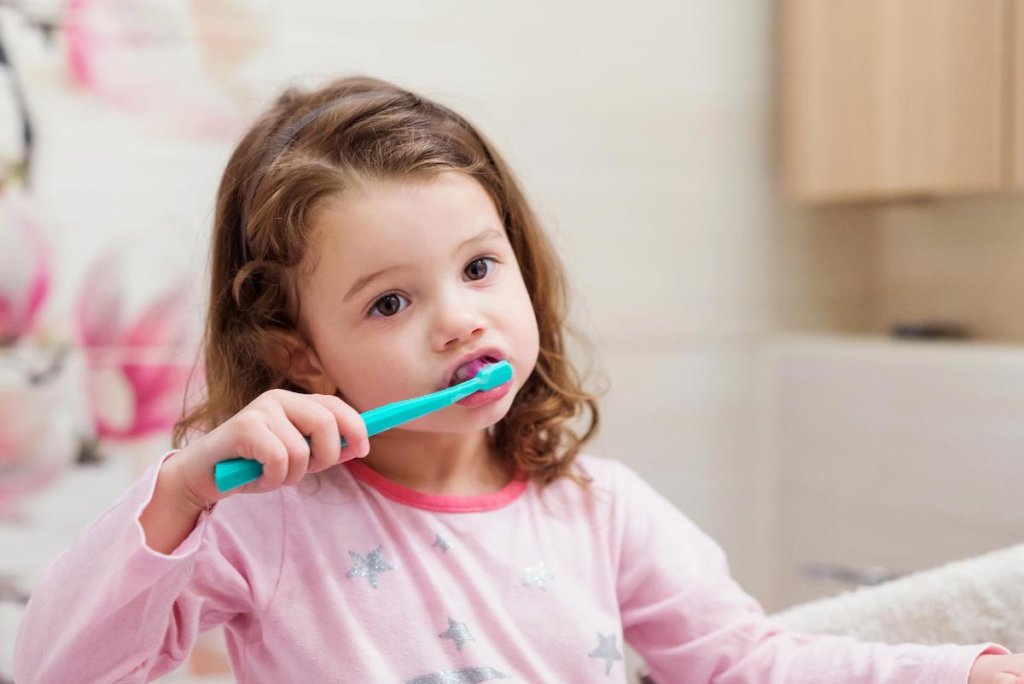Some parents aren’t overly concerned with their kids’ baby teeth. They figure, “Well, the baby teeth are going to fall out anyway, right? We’ll worry about keeping their teeth clean once the adult teeth are in.”
This logic is HIGHLY flawed for a few reasons.
- If you don’t help your child develop good brushing ad flossing habits early, there is little chance they will develop healthy habits later.
- If your child gets cavities when they are young and has to spend an unpleasant visit in the dental chair, there is a greater chance they won’t like going to the dentist when they are older.
- While a child’s front teeth come out around the age of 6, their back teeth last until around the age of 10 or 11. These back teeth are highly prone to cavities – so, even though they will fall out, you really need to consider taking good care of them!
Just like parenting for behavior, parenting for hygiene and health takes time and effort. I would argue it is just as important.
So – let’s talk strategy.
At what age can my child brush their teeth (without my help)?
Believe it or not, you should continue brushing your child’s teeth until he’s 8 or 9 years old. Around age 8 or 9, children have fully developed the fine motor skills needed for tooth brushing.
I know this probably comes as a shock. Many parents turn over toothbrushing responsibilities to their kids much earlier. Young children who are brushing their own teeth, especially without supervision for thoroughness, come into my office with cavities.
While it may LOOK like your six-year-old can brush their own teeth, they don’t have the fine motor skills to do it well enough. Technically, I could let my six-year-old fold the laundry, but would it be Marie Kondo-worthy? Probably not. That’s ok when we’re talking about some wrinkled clothes, but not when we’re talking about damage to teeth. If you want your kids to remain cavity-free, you need to dedicate some time and energy to making sure their teeth are truly clean. Until the age of 8 or 9, this means that you brush their teeth for them.
Even after 8 or 9, supervision is often needed until you are sure they can do it well enough by themselves. Those moments when the extra time seems like too much, think of the extra money in your pocket every time your child makes it through a dental visit with no cavities.
Tools of the trade:
Toothbrush: Make sure your kiddos are brushing with a child’s toothbrush. If their mouth is not the same size as yours, then an adult toothbrush is too big. Always make sure it’s a soft toothbrush! The only place for a firm toothbrush is for cleaning grout, NOT teeth!
Replace their toothbrush every three months. (At my house we keep a ready supply of fun character-themed toothbrushes in a cupboard so that when it’s time to throw one away, we have a few on hand to choose from).
At Anderson Dental Care we give your kiddo a new toothbrush every time they come in for a visit, so we’ve already taken care of 2 of the 4 toothbrushes they need for the year! Whoot-Whoot!
Should you use a manual or electric toothbrush? Really, this comes down to parental preference. For me personally, I use manual toothbrushes because my kids are so young and I’m heavily involved in cleaning their teeth (read: their head in my lap while I brush their teeth). But I’ve heard from many parents who love electric toothbrushes because they feel it makes their job easier and their kids love the timer on the toothbrush. I think either is fine; what really matters is that YOU HELP THEM. Giving a child an electric toothbrush and telling them to go for it won’t work; you still have to help them until at least age 8 or 9. Do what works for you as long as you actually do it!
Floss: I know it’s hard to reach inside your child’s mouth to floss. It’s not super comfortable for either of you — I get it. But if you want your child to floss when they’re older, you have to start them young.
Take a good look at your child’s teeth — are they close together or are there spaces? If you’ve been following along with my articles, you know I have four kids. Two of them have tighter teeth, and two of them have spaces between their teeth. I floss all of them the same, but it’s important to note that if your child’s teeth are close together, they have a higher risk of getting cavities between those teeth.
When it comes to floss, you have a few options.
- A flavored floss, like Strawberry or Coconut from Coco Floss is a good bet if your kiddo is flavor driven (easy to find on amazon – this is not a sponsored ad).
- If you hate reaching inside your child’s mouth, you can opt for floss picks or wear gloves.
Toothpaste: Non-fluoridated toothpaste is essential until your child knows how to not swallow it and how to spit. Fluoride, if ingested in large amounts, has been linked to health issues, so you must supervise a good spit. Also, if your child is at the age when they might eat that delicious tube of goo the minute you’re not looking – you want to make sure it doesn’t have fluoride.
Once your kiddo can spit and isn’t in danger of eating a tube of toothpaste, then go ahead and switch to a fluoridated toothpaste (usually between ages 2 and 3).
How to brush a child’s teeth:
I wrote a detailed article on precisely HOW to brush your child’s teeth. This method is tried and true and helps to produce a cavity-free child who has no issue sitting still in a dental chair. Once your little one is used to this alternative brushing method, it’s smooth sailing for both of you.
If you ever have questions about your child’s teeth, don’t hesitate to contact our Cincinnati office. At Anderson Dental Care we have a great reputation among our families with small children for creating a great experience for their kids. We offer “happy visits” for even the youngest family members and family appointments where the whole crew can come in together to our dental office and get their teeth cleaned.
If your kids aren’t being seen regularly by a dentist due to cost, you’ll be happy to know that we provide an affordable alternative to paying out of pocket or carrying pricey dental insurance.
At Anderson Dental Care, we offer a PREMIER DENTAL CARE MEMBERSHIP, and our members save 20% on dental procedures and get anywhere from 2-4 maintenance cleanings a year. Packages for children are $26/month.

